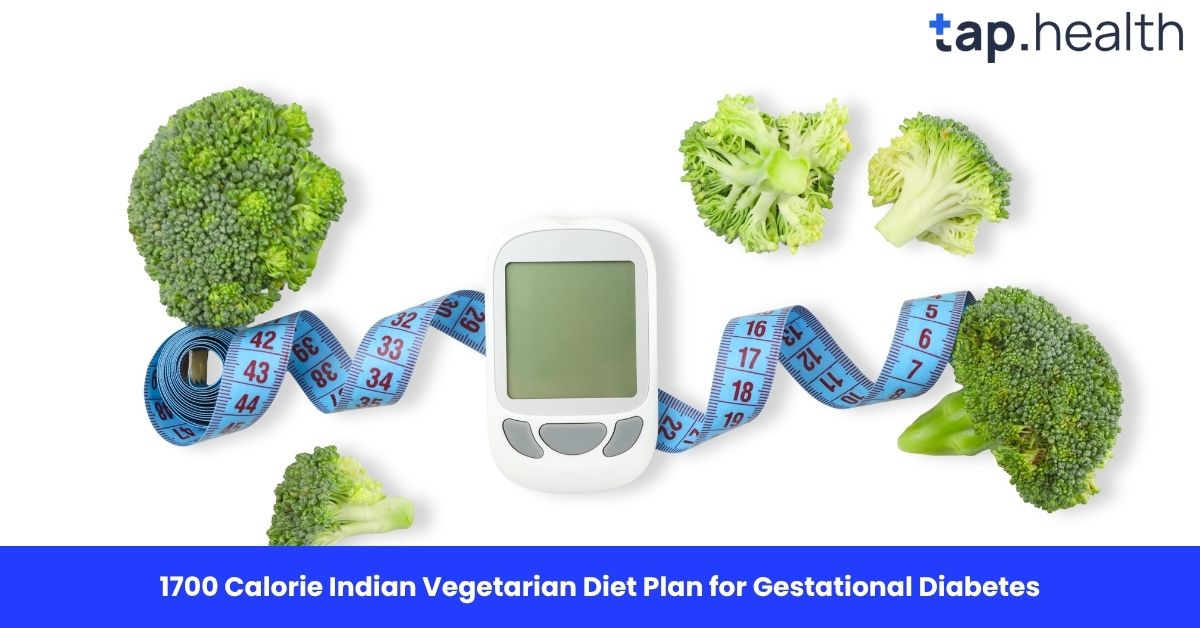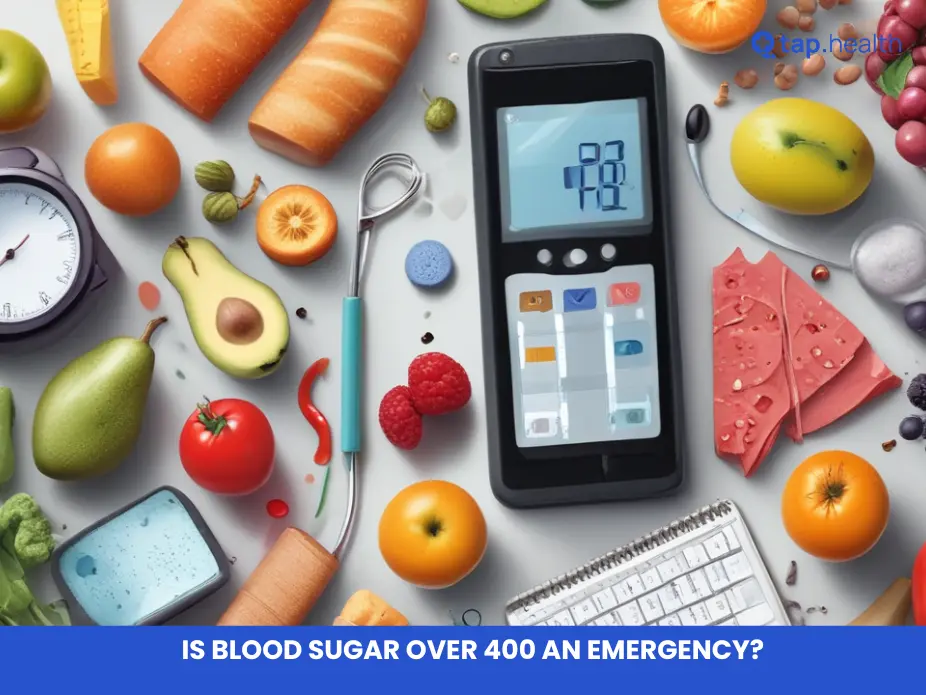Gestational diabetes is a temporary condition that affects some women during pregnancy, where the body’s ability to produce insulin is impaired, leading to high blood sugar levels. The good news is that with the right diet and lifestyle adjustments, gestational diabetes can be effectively managed.
One of the most important aspects of managing gestational diabetes is diet. The right food choices can help regulate blood sugar, support a healthy pregnancy, and reduce the risk of complications. In this blog, we will explore a 1700 calorie Indian vegetarian diet plan specifically designed for managing gestational diabetes.
This guide is structured to provide you with an understanding of gestational diabetes, why a 1700 calorie vegetarian diet works, and practical meal ideas that can help you stay healthy during pregnancy. We will also answer common questions and provide expert tips to ensure you are following the best practices for managing blood sugar.
What is Gestational Diabetes?
Gestational diabetes (GD) occurs during pregnancy when the body cannot produce enough insulin to meet the increased needs, resulting in high blood sugar levels. This condition usually develops around the 24th to 28th week of pregnancy and can lead to complications such as:
- High birth weight
- Premature delivery
- Preeclampsia (high blood pressure during pregnancy)
- Increased risk of type 2 diabetes later in life for both mother and child
With proper management, which includes a balanced diet, exercise, and monitoring blood sugar levels, most women with gestational diabetes can have a healthy pregnancy and delivery.
Why is a 1700 Calorie Diet Plan Important for Gestational Diabetes?
A 1700 calorie diet plan is often recommended for pregnant women with gestational diabetes to ensure that they consume enough calories for both the mother’s and baby’s needs without overloading the body with excess sugar or fat. The diet needs to be balanced to avoid blood sugar spikes while providing sufficient nutrition.
Key benefits of a 1700 calorie Indian vegetarian diet for gestational diabetes include:
- Blood Sugar Regulation: By consuming balanced meals with a low glycemic index, you can help keep blood sugar levels in check.
- Healthy Weight Gain: Proper calorie intake supports healthy weight gain during pregnancy, without excess fat.
- Nutritional Balance: A well-planned diet ensures the right intake of essential vitamins and minerals that support both maternal health and fetal development.
Key Components of a 1700 Calorie Indian Vegetarian Diet Plan
The 1700 calorie diet for gestational diabetes focuses on maintaining a balance between carbohydrates, proteins, and fats while keeping the glycemic index of foods low. Here are the main components that should be included in your diet:
1. Low Glycemic Index (GI) Foods
Low-GI foods release glucose slowly into the bloodstream, preventing rapid spikes in blood sugar levels. These foods include:
- Whole grains like brown rice, quinoa, and oats
- Legumes such as lentils, chickpeas, and beans
- Non-starchy vegetables like spinach, cauliflower, and zucchini
2. High-Fibre Foods
Fibre helps slow down the digestion of carbohydrates and the absorption of sugar, making it an essential component of a diabetes-friendly diet. Include:
- Vegetables
- Fruits with high fibre content like apples, berries, and pears
- Whole grains and legumes
3. Lean Proteins
Protein helps regulate blood sugar levels and is essential for maintaining muscle mass during pregnancy. Include plant-based protein sources such as:
- Lentils, beans, and chickpeas
- Tofu and tempeh
- Low-fat dairy products like milk, yogurt, and paneer
4. Healthy Fats
Healthy fats from sources like nuts, seeds, and olive oil help in hormone production and maintaining heart health, which is especially important during pregnancy.
5. Smaller, Frequent Meals
Eating smaller, balanced meals throughout the day helps prevent blood sugar fluctuations and ensures a steady supply of energy.
Foods to Include in a 1700 Calorie Indian Vegetarian Diet Plan for Gestational Diabetes
Here are some foods that should be incorporated into your 1700 calorie diet to help manage gestational diabetes:
Non-Starchy Vegetables
Vegetables like spinach, cauliflower, zucchini, bell peppers, carrots, and tomatoes should form the foundation of your meals. These are low in calories and high in essential nutrients.
Whole Grains
Whole grains such as brown rice, quinoa, whole wheat, and oats provide fibre and energy, making them ideal for people with gestational diabetes. They help regulate blood sugar and provide lasting energy throughout the day.
Legumes and Pulses
Lentils, chickpeas, beans, and peas are excellent sources of plant-based protein and fibre. They have a low glycemic index and can be included in soups, salads, and curries.
Fruits
Choose low-glycemic fruits such as apples, pears, berries, and citrus fruits. Avoid high-sugar fruits like bananas, mangoes, and grapes, which can cause spikes in blood sugar.
Nuts and Seeds
Almonds, walnuts, flaxseeds, chia seeds, and sunflower seeds provide healthy fats, fibre, and protein. They can be eaten as snacks or added to meals like salads or smoothies.
Low-Fat Dairy
Low-fat dairy options like skimmed milk, low-fat yogurt, and paneer are a good source of calcium and protein. Avoid full-fat dairy products, which can increase calorie intake and contribute to excessive weight gain.
Healthy Fats
Incorporate healthy fats from sources like olive oil, avocado, and nuts. These fats provide essential fatty acids that support fetal development and reduce inflammation.
Sample 1700 Calorie Indian Vegetarian Diet Plan for Gestational Diabetes
Here is a sample 1700 calorie Indian vegetarian diet plan for managing gestational diabetes. This plan includes a variety of foods that provide balanced nutrition while maintaining blood sugar levels.
Breakfast (400 calories)
- 1 bowl of vegetable upma made with semolina (rava) and a variety of vegetables (like carrots, peas, and beans)
- 1 boiled egg (for additional protein)
- 1 cup of masala chai with skimmed milk (no sugar)
Mid-Morning Snack (150 calories)
- 1 small apple with 10 almonds
Lunch (450 calories)
- 1 cup of brown rice
- 1 cup of dal (lentils) cooked with spinach
- 1 small bowl of mixed salad (cucumber, tomatoes, and onions) with lemon and olive oil dressing
- 1 small serving of raita (low-fat yogurt with cucumber)
Afternoon Snack (150 calories)
- 1 small bowl of mixed vegetable sticks (carrot, cucumber, and bell pepper) with hummus
Dinner (450 calories)
- 1 serving of stir-fried tofu with broccoli, bell peppers, and zucchini, cooked with olive oil
- 1 small whole wheat roti (1 piece)
- 1 small bowl of low-fat yogurt
Before Bed Snack (50 calories)
- 1 small handful of walnuts or flaxseeds
Nutritional Breakdown of the 1700 Calorie Diet
The diet plan above ensures a balanced intake of macronutrients. Here’s a rough breakdown of the nutritional composition:
- Carbohydrates: 45-50% of total calories (Focus on complex carbs like whole grains and legumes)
- Proteins: 20-25% of total calories (Include plant-based proteins like lentils, tofu, and beans)
- Fats: 25-30% of total calories (Use healthy fats like olive oil, avocado, and nuts)
Benefits of a 1700 Calorie Indian Vegetarian Diet Plan for Gestational Diabetes
1. Better Blood Sugar Control
By focusing on low glycemic index foods and high-fibre meals, this diet helps regulate blood sugar levels and prevents rapid spikes, which is crucial for managing gestational diabetes.
2. Supports Healthy Pregnancy Weight
A 1700 calorie diet plan helps prevent excessive weight gain while ensuring that both the mother and baby receive adequate nutrition. This balanced approach reduces the risk of complications such as high birth weight.
3. Reduces Risk of Gestational Diabetes Complications
Following a well-structured diet plan helps reduce the risk of complications like preeclampsia, premature birth, and the need for a C-section.
4. Improves Overall Health
This diet supports overall health, providing essential vitamins, minerals, and antioxidants for the mother, while contributing to the healthy growth and development of the baby.
Key Takeaways
A 1700 calorie Indian vegetarian diet plan for gestational diabetes helps maintain stable blood sugar levels, supports healthy weight gain, and provides essential nutrients for both mother and baby. By incorporating low-GI foods, lean proteins, healthy fats, and high-fibre options, this diet can help ensure a healthy pregnancy and reduce the risk of complications.
It is crucial to monitor portion sizes and focus on balanced meals throughout the day. With the right guidance and a well-rounded diet plan, managing gestational diabetes is possible and can contribute to a successful pregnancy and a healthy baby.
FAQs on 1700 Calorie Indian Vegetarian Diet Plan for Gestational Diabetes
What foods should be avoided with gestational diabetes?
Foods to avoid include refined carbohydrates, sugary drinks, white bread, and processed snacks. These foods can cause rapid blood sugar spikes. Instead, focus on whole grains, vegetables, legumes, and low-glycemic fruits.
Is a vegetarian diet good for gestational diabetes?
Yes, a vegetarian diet can effectively manage gestational diabetes. By focusing on plant-based proteins, whole grains, and fibre-rich vegetables, a vegetarian diet can help regulate blood sugar levels and provide necessary nutrients.
How many meals should I eat in a day for gestational diabetes?
It is recommended to eat three balanced meals and two to three healthy snacks spread throughout the day. This helps maintain stable blood sugar levels and provides consistent energy.
Can I drink fruit juice with gestational diabetes?
It is best to avoid fruit juices as they contain high levels of natural sugars that can cause blood sugar spikes. Whole fruits are a better option due to their fibre content, which helps regulate blood sugar.
What are the signs of gestational diabetes?
Signs may include increased thirst, frequent urination, tiredness, and blurred vision. However, many women may not experience symptoms, which is why screening during pregnancy is important.
Can exercise help with gestational diabetes?
Yes, regular physical activity like walking, swimming, or yoga can help improve insulin sensitivity and control blood sugar levels. Always consult with your healthcare provider before starting an exercise routine.
Can gestational diabetes go away after pregnancy?
Gestational diabetes usually goes away after childbirth. However, it increases the risk of developing type 2 diabetes later in life, so it’s important to maintain a healthy diet and lifestyle post-pregnancy.



